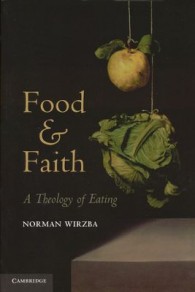Listening to food – what it tells us about who we are…

Eating is about more than taking on fuel. Whether we realize or not, eating is a window into our most basic beliefs about ourselves and the world in which we live.
“Human beings don’t just eat to live,” explains theologian Norman Wirzba. “We eat to do a lot else.”
In “Thinking Theologically About Food,” the first chapter in Food & Faith: A Theology of Eating, Wirzba sets up a sort of thought experiment – “… imagine all creatures as self-subsisting, noneating entities that never take a bite.”
But then we would also have to envision a tasteless and lonely world without belonging and fellowship, a world without the varied delights that accompany the procuring, preparing, and sharing of food. Eating joins people to each other, to other creatures and the world, and to God through forms of “natural communion” too complex to fathom. It introduces us to a graced world of hospitality, a creation from the beginning (and constantly through its soil) absorbs death and makes room for newness of life. Eating involves us in a daily life and death drama in which, beyond all comprehension, some life is sacrificed so that other life can thrive. It establishes a membership that confirms all creatures as profoundly in need of each other and upon God to provide life’s nutrition and vitality
Food is a holy and humbling mystery. … Whenever people come to the table they demonstrate with unmistakable evidence of their stomachs that they are not self-subsisting gods. They are finite and mortal creatures dependent on God’s many good gifts: sunlight, photosynthesis, decomposition, soil fertility, water, bees and butterflies, chickens, sheep, cows, gardeners, farmers, cooks, strangers, and friends (the list goes on and on). Eating reminds us that we participate in a grace-saturated world, a blessed creation worthy of attention, care, and celebration. Despite what food marketers may say, there really is no such thing as “cheap” or “convenient” food. Real food, the food that is the source of creaturely health and delight, is precious because it is a fundamental means through which God’s nurture and love for the whole creation are expressed. …
The character and pace of much contemporary life makes it less likely that people will perceive the mystery of food or receive it as a precious gift and sign of God’s sustaining care. Though information about food abounds, many of today’s eaters are among the most ignorant the world has ever known. This is because people lack the sensitivity, imagination, and understanding that come from the growing, preserving, and preparing of food. Not having the attention or skill that develops while working in a garden and kitchen, they also miss the necessary knowledge, affection, and insight. Too many people don’t really know where food comes from or what is practically required (ecologically but also culturally) for food to be healthy and plentiful over the long term. As a result, they risk perpetuating what Wendell Berry has called one of the great superstitions of our consumer age, namely the superstition that “money brings forth food.” …
To eat is to be implicated in a vast, complex, interweaving set of life and death dramas in which we are only one character among many. No matter how solitary our eating experience may be, every sniff, chomp, and swallow connects us to vast global trade networks and thus to biophysical and social worlds far beyond ourselves. The moment we chew on anything we participate in regional, geographic histories and in biochemical processes that, for all their diversity and complexity, defy our wildest imaginations and most thorough attempts at comprehension. The minute we contemplate or talk about eating, we show ourselves to be involved in culinary traditions and cultural taboos, as well as moral quandaries and spiritual quests. To amend an ecologist’s maxim: we can never only bite into one thing.
Food is about the relationships that join us to the earth, fellow creatures, loved ones and guests, and ultimately God. How we eat testifies to whether we value the creatures we live with and depend upon. To eat is to savor and struggle with the mystery of creatureliness. When our eating is mindful, we celebrate the goodness of fields, gardens, forests and watersheds, and the skill of those who can nurture seed and animal life into delicious food. We acknowledge and honor God as the giver of every good and perfect gift. But we also learn to correct our own arrogance, boredom, and ingratitude. Eating invites people to develop a deeper appreciation for where they are and who they are with so that their eating can be a sacramental rather than a sacrilegious act. A thoughtful, theological relation to food makes possible the discovery that eating is among the most intimate and pleasing ways possible for us to enter into the memberships of creation and find there the God who daily blesses and feeds life. …
Norman Wirzba is Research Professor of Theology, Ecology, and Rural Life at Duke Divinity School. These excerpts are from Food and Faith: A Theology of Eating, “Thinking Theologically About Food (Chapter 1).


 July 29, 2014
July 29, 2014 







Comments are closed.